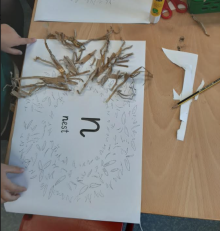Resilience is a word often mentioned in school, but why is it important?

Resilience means being able to bounce back from stress, challenge, tragedy, trauma or adversity. When children are resilient, they are braver, more curious, more adaptable, and more capable of extending their reach into the world.
No matter what their life circumstances, sooner or later all children encounter setbacks. The ability to bounce back from adversity is crucial, whether that means getting over the loss of a favourite toy, coping with the distress of finding a best friend prefers to play with another child, or making progress despite a learning disability.
Resilience is developed over time. The more practice your child gets, the more resilient they become. Giving your child plenty of space and opportunities for creative, self-directed, exploratory play is important in order to develop resilience. Nothing is better for building resilience as a child than choosing their own play, making their own mistakes, and finding their own solutions to problems, real or imagined.
Children cannot learn to be resilient without the support of parents and teachers to help them understand the difficulties they face, and provide them with a safe physical environment in which they are not afraid to make mistakes and can seek help from positive supportive adults. Children have to be given opportunities for skill-building, decision-making and planning.
Reading or listening to stories are very powerful tools to help children understand the world they live in and how to overcome obstacles and adversity. Our younger pupils listen to numerous stories and the older children begin to read independently books with relevant themes. Some year topics are based on books with themes that include resilience. Mrs Palmer based a recent Upper Primary Assembly on a poem Hope-o-potamus by Greg James and Chris Smith. It focused on the theme of persistence, encouragement and the support of friends. A popular and much used book in Lower Primary is My Fantastic Elastic Brain by JoAnn Deak which centres on growth mindsets, encourages children to keep trying and that tells them that it is OK to make mistakes.
If you would like to learn more, the internet has a wealth of information, advice and resources on resilience, and a simple search provides a list of children's books with resilience as a theme.
Sources: https://positivepsychology.com/teaching-resilience/
Public Health England Building children and young people’s resilience in schools



















.png&command_2=resize&height_2=85)











